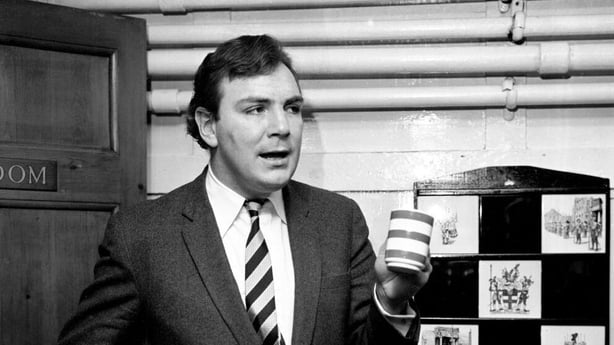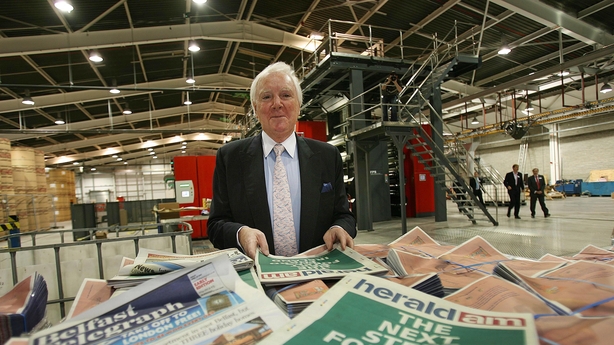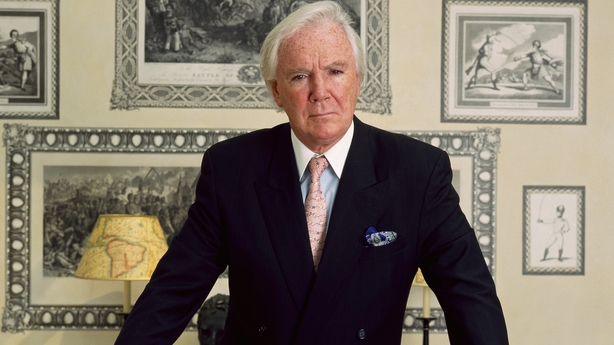Businessman Tony O’Reilly has died in Dublin following a short illness.
He was aged 88.
A spokesperson said Mr O’Reilly was surrounded by family members when he passed away in St Vincent’s Hospital today.
In a statement, Mr O’Reilly’s family said: “In the coming days there will be many worthy tributes made to Tony O’Reilly’s unique and extraordinary achievements in the fields of business and sport.
“As well as his extraordinary philanthropic vision which was best evidenced by the establishment of the Ireland Funds at a dark time in this island’s history.
“But, for us, he was a dearly-loved dad and a granddad. He lived one of the great lives and we were fortunate to spend time with him in recent weeks as that great life drew to a close.”
We need your consent to load this rte-player contentWe use rte-player to manage extra content that can set cookies on your device and collect data about your activity. Please review their details and accept them to load the content.Manage Preferences
Mr O’Reilly was a widely respected marketeer who invented Kerrygold butter, a sporting hero with an unrivalled rugby record and a philanthropist.
His business interests spanned newspapers, food, crystal, oil exploration, telecoms and television distribution.
Ultimately his empire unravelled but at home and abroad the corporate world is still dotted with companies he started, grew or acquired.
He will always be considered one of Ireland’s leading business figures.
Tony O’Reilly was born in Dublin in 1936.
He was educated in the Jesuit school Belvedere College where his rugby prowess quickly shone.
Aged 18 he made his international debut as a centre against France in 1955.
That same year he became the youngest-ever player selected for the British and Irish Lions.
His record for the number of tries scored by a Lions player still stands.
He studied law in University College Dublin, he then worked in fuel importer Suttons in Cork, before joining the Irish Dairy Board or Bord Bainne.
In the 1960s Irish farmers sold unbranded butter to the UK and it was frequently mixed with produce from other locations – sometimes diminishing its quality.
Mr O’Reilly invented an umbrella brand called Kerrygold and developed it into groundbreaking international success.
It remains one of Ireland’s most well-known global consumer brands.
Listen: Tony O’Reilly takes control of Irish Independent in 1973
We need your consent to load this rte-player contentWe use rte-player to manage extra content that can set cookies on your device and collect data about your activity. Please review their details and accept them to load the content.Manage Preferences
Establishing Kerrygold won Mr O’Reilly international recognition at the age of 26.
By this time he had married Susan Cameron whom he had met when playing rugby with the Lions in Australia.
Following his success in Bord Bianne he led Irish Sugar and developed a joint venture with US food giant Heinz.
He was spotted by Henry J Heinz, the grandson of the founder of the US company.
Mr O’Reilly joined the multinational and rapidly rose through the ranks.
By the time he was 33 he was chief executive of its UK operation in Britain with 10,000 employees.
He then moved to its US headquarters in Pittsburg.
The unusual feature of Mr O’Reilly’s path in business was that he had multiple careers at the one time.
While ascending the corporate ladder in Heinz he was also rapidly growing his own personal business empire in Ireland.
He frequently flew from work in Pittsburg on a Friday evening to New York and then to Dublin, squeezed in meetings and rugby match before returning to the US to be back at his desk at 8am on Monday morning.
In 1973 at the age of 36 he took control of Independent Newspapers – publisher of the Irish Independent, Sunday Independent and Evening Herald.
He also explored for oil and gas with Atlantic Resources but failed to make a commercially viable find and he led industrial holdings company Fitzwilton.
In 1979 he became president of the Heinz and 1987 he became the first non-family member to be chairman.

In Ireland he took control of crystal and ceramic group Waterford Wedgwood in 1990 and saved it from financial collapse as it had been struggling with rising costs and escalating losses.
By this time his marriage to Susan was over. They had six children. In 1991 he married Greek shipping heiress Cryss Goulandris.
Mr O’Reilly was also an active philanthropist and set up the Ireland Funds which ploughed money from US donors into reconciliation projects around the border.
The late SDLP deputy leader, Seamus Mallon, told RTÉ by “setting up the Ireland Funds they gave a focal point to Irish Americans and people in America who wanted to help in Northern Ireland but didn’t want to be involved in supporting violence”.
However, his work on the Ireland Funds made him a target of paramilitaries.
We need your consent to load this rte-player contentWe use rte-player to manage extra content that can set cookies on your device and collect data about your activity. Please review their details and accept them to load the content.Manage Preferences
His son Tony O’Reilly Jr said: “There were probably bullets sent in the mail, you I know in the early 80s there was threats of kidnapping and all that, but I think my father took it in his stride, we didn’t have security, we didn’t have anything. At the end of the day he just said if they want me they will get me.”
At the same time, Mr O’Reilly continued to expand his business interests in Ireland.
Under his stewardship the Independent grew internationally expanding into New Zealand, Australia, Northern Ireland and Britain.
Mr O’Reilly also responded to a call by Nelson Mandela, with whom he was close, for increased international investment in South Africa after the ANC took power.
In 1999 the Irish government sold off Eircom in an expensive floatation which saw thousands of members of the public buy overpriced shares during a telecoms boom.
The stock price rapidly fell after the flotation, shareholders were burned and pressure came on the Eircom board to return as much money as possible to out-of-pocket investors.
After a protracted takeover battle with Denis O’Brien in 2001, Mr O’Reilly successfully gained control of the company.

He had wooed trade unions which controlled a substantial stake in Eircom allowing his consortium take over the company.
But the tussle between the two businessmen was not amicable.
Some years later Mr O’Brien began buying share in Independent, steadily increased his stake and then became vocal in his criticism of Tony O’Reilly’s stewardship of the group.
By 2012, Mr O’Reilly and his son Gavin, who had led the company, were ousted by Mr O’Brien.
But by, then there were other pressing problems.
The global financial crisis had severely dented consumer confidence.
Changing tastes and had turned buyers away from Waterford Wedgwood products and the company was haemorrhaging cash.
Mr O’Reilly and his brother-in-law Peter Goulandris had poured funds into the group to keep it alive for years.
Ivan Fallon, Tony O’Reilly’s biographer, said: “I can remember one day driving along with Tony. And he was on the phone desperately trying to find $17 million from some of his own private interests, talking to people who managed his money in the US or whatever.

“And he turned to me afterwards and said ‘That is money I will never see again but without that the wages won’t be paid this weekend’.”
In its last weeks, Mr O’Reilly and Mr Goulandris invested a final €50m in the hopes of securing a financial rescue package from Bank of America.
But the deal fell apart and so did Waterford Wedgwood.
Mr O’Reilly had bet many of his own assets to save the company.
By this time he was in a financial quandary as he no longer received a dividend from Independent and faced borrowing he could no longer pay.
His financial empire began to crumble and State-owned AIB appointed a receiver over some of his assets forcing him to sell his properties in Ireland.
He went into bankruptcy in the Bahamas at the same time as he was battling health problems.
It was a tough chapter for the man who had always enjoyed success.
However, he has left a legacy which continues to endure. The Ireland Funds continues its charitable work.
Big brands such as Kerrygold would never have been the successes they are today were it not for Tony O’Reilly.
Additional reporting: Will Goodbody

